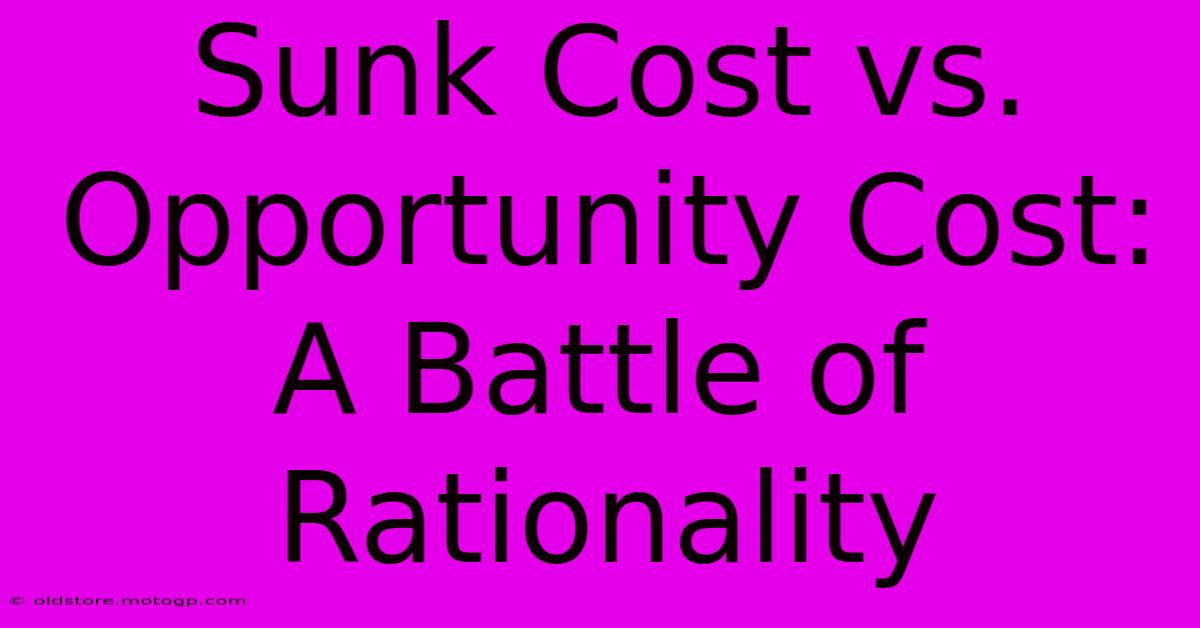Sunk Cost Vs. Opportunity Cost: A Battle Of Rationality

Table of Contents
Sunk Cost vs. Opportunity Cost: A Battle of Rationality
We all face tough decisions, especially when it comes to finances and resource allocation. Two key economic concepts often clash in these situations: sunk cost and opportunity cost. Understanding the difference and how they influence our choices is crucial for making rational decisions, maximizing our returns, and avoiding costly mistakes. This article will delve into the intricacies of each concept and explore how to navigate their often conflicting demands.
Understanding Sunk Cost
A sunk cost is a cost that has already been incurred and cannot be recovered. It's money, time, or effort that's irretrievably gone. Think of it as a past expenditure that's irrelevant to future decisions. Examples include:
- A non-refundable deposit: You paid for a workshop you no longer want to attend. That money is gone, regardless of your future actions.
- Money spent on a depreciating asset: You bought a car that's now worth less than you paid. The initial purchase price is a sunk cost.
- Time invested in a failing project: You've dedicated months to a project that isn't yielding results. The time spent is a sunk cost.
The sunk cost fallacy occurs when we let sunk costs influence our future decisions. We might continue investing in a failing project simply because we've already invested so much, even if it's clear it's not going to succeed. This is irrational behavior. The rational approach is to focus on future potential, not past expenditures.
Recognizing the Sunk Cost Fallacy in Your Life
Are you guilty of clinging to something simply because you've already invested time or money? Do you find yourself justifying continued investment in a losing venture? If so, you might be falling prey to the sunk cost fallacy. Examples include:
- Staying in a bad relationship: You've invested years, but the relationship is toxic. The past investment shouldn't justify staying.
- Continuing a losing investment: You've lost money on a stock, but refuse to sell, hoping to recoup your losses.
- Finishing a book you hate: You're halfway through a book you're not enjoying, but feel obligated to finish it.
Grasping Opportunity Cost
Unlike sunk costs, opportunity cost represents the potential benefits an individual, investor, or business misses out on when choosing one alternative over another. It's the cost of the next best alternative forgone. It's not an actual cash outlay but a potential gain sacrificed. Examples include:
- Investing in stocks vs. real estate: If you invest in stocks, the potential return from real estate is your opportunity cost.
- Taking a job vs. starting a business: If you choose a job, the potential profits from your business are your opportunity cost.
- Spending money on a vacation vs. paying down debt: If you choose a vacation, the reduced debt and associated interest savings represent your opportunity cost.
Maximizing Your Returns by Considering Opportunity Cost
To make sound decisions, you need to weigh the potential gains of your chosen option against the potential gains of the next best alternative. A higher opportunity cost suggests a potentially better alternative is being foregone. Consider these questions:
- What are the potential benefits of each option?
- What are the potential downsides of each option?
- Which option offers the highest net benefit, considering both the potential gains and opportunity costs?
Sunk Cost vs. Opportunity Cost: The Showdown
The key difference lies in their relevance to future decisions. Sunk costs are irrelevant; opportunity costs are critical. A rational decision-maker focuses on opportunity costs and ignores sunk costs. For instance, if you've already paid for a concert ticket but feel unwell, attending would mean sacrificing a potential night of rest (opportunity cost). The ticket price is irrelevant because it's a sunk cost.
Conclusion: Making Rational Choices
By understanding the distinction between sunk costs and opportunity costs, you can make more rational decisions in various aspects of life, from personal finances to professional endeavors. Remember, clinging to sunk costs often leads to poor outcomes. Focusing on maximizing your future returns by considering opportunity costs is the key to making smart and profitable choices. This requires discipline, the ability to objectively assess situations, and a willingness to let go of past investments when necessary.

Thank you for visiting our website wich cover about Sunk Cost Vs. Opportunity Cost: A Battle Of Rationality. We hope the information provided has been useful to you. Feel free to contact us if you have any questions or need further assistance. See you next time and dont miss to bookmark.
Featured Posts
-
Negen Zetels Voor Bbb In Overijssel
Feb 04, 2025
-
Khawaja Defends Lalor After Reporter Dumped
Feb 04, 2025
-
Lara Dibildos Evita Preguntas Prensa
Feb 04, 2025
-
Wow 0 E194 B The Hex Code That Will Ignite Your Web Presence
Feb 04, 2025
-
Breaking The Bank For Sporting Superstars The Most Opulent Paychecks In College Athletics
Feb 04, 2025
